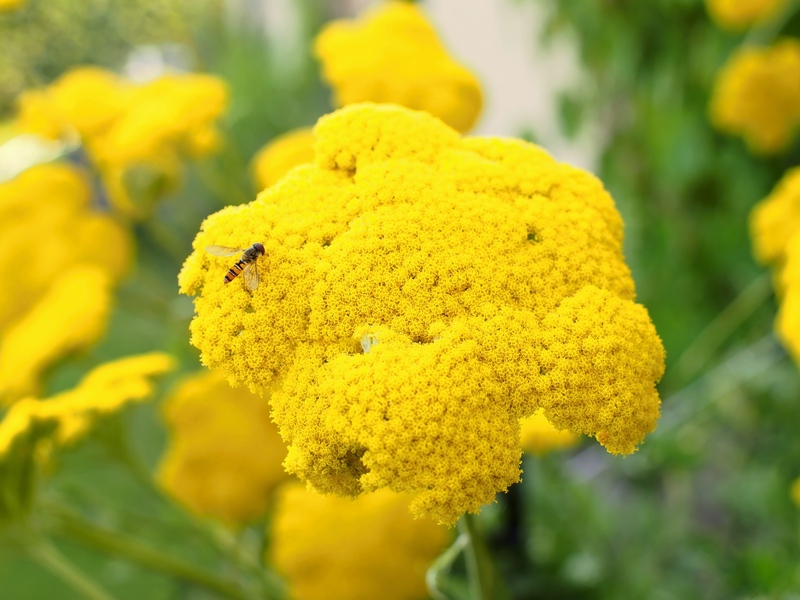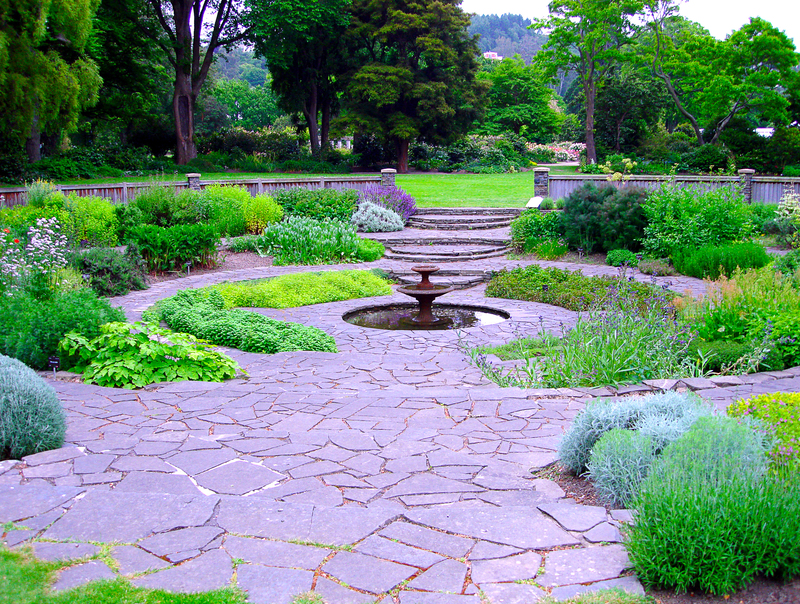Herb Gardening Made Easy: Tips and Tricks
Posted on 27/05/2025
Herb Gardening Made Easy: Tips and Tricks
Herb gardening isn't just a rewarding hobby--it's a solution for healthier cooking, a way to enhance the beauty of your home, and a practical approach to sustainable living. If you've ever wanted to grow your own flavorful herbs but worried it might be complicated, this comprehensive guide will show you just how simple and enjoyable herb gardening can be. Let's explore pro tips, easy tricks, and essential advice to help even total beginners start a thriving herb garden right at home.

Why Start Your Own Herb Garden?
- Fresh Flavor Anytime: Nothing beats the aroma and taste of herbs picked fresh from your garden.
- Cost Savings: Growing your own is far more economical than frequently buying small bunches at the store.
- Control Over Quality: You'll always know your herbs are free from unwanted chemicals or pesticides.
- Aromatherapy and Beauty: Herbs like lavender and rosemary add delightful fragrance and look beautiful in any space.
- Natural Remedies: Many herbs offer health benefits, from soothing digestive issues to calming stress.
Choosing the Perfect Herbs to Grow
With hundreds of varieties to choose from, deciding which herbs to plant can feel overwhelming. Start with some easy-to-grow herbs that are both popular and forgiving for beginners.
Top 7 Beginner-Friendly Herbs
- Basil: A favorite for pesto, salads, and Italian cooking. Plant in warm, sunny spots.
- Mint: Thrives almost anywhere but keep it in containers as it spreads quickly.
- Parsley: Versatile, nutritious, and grows well in partial shade.
- Chives: Easy to grow and perfect for garnishing everything from potatoes to omelets.
- Rosemary: Prefers lots of sunlight and well-drained soil.
- Thyme: Drought-tolerant and adds subtle flavor to cooking.
- Cilantro (Coriander): Best for salsas, curries, and Asian dishes; prefers cooler weather.
Herb Gardening Tips for Every Situation
Herb gardens can flourish in a variety of settings. Whether you live in a large house with a backyard or a small apartment, you can find a way to incorporate herb gardening into your lifestyle. Here's how:
Outdoor Herb Gardening
- Choose the Right Location: Most herbs love full sun. Select a spot that receives at least six hours of sunlight daily.
- Soil Preparation: Herbs grow best in loamy, well-draining soil. Mix in organic compost to enrich the nutrient content.
- Watering Technique: Overwatering is a common mistake. Herbs need moist, but not soggy, soil. Water in the early morning for best results.
- Proper Spacing: Give each plant enough room to grow--check the tag or seed packet for spacing guidelines.
Container Herb Gardening
- Picking the Right Pots: Select containers with good drainage. Herbs don't like standing water.
- Potting Mix: Use a high-quality potting soil rather than garden soil, which may be too dense for containers.
- Don't Overcrowd: Group compatible herbs together, but don't cram them. Crowded roots make for unhealthy plants.
- Move as Needed: Portable pots mean you can move your herbs to catch the most sunlight or shelter them from harsh weather.
Indoor Herb Gardening
- Find a Sunny Spot: Windowsills facing south or west are ideal. Herbs indoors need at least six hours of good sunlight daily.
- Artificial Lighting: If natural light is limited, use inexpensive LED grow lights.
- Regular Harvesting: Snip herbs often to encourage bushier growth and stronger flavor.
- Watch for Pests: Indoor herbs can attract aphids and spider mites. Inspect regularly and remove pests by hand or with insecticidal soap.
Getting Started: Step-by-Step Herb Gardening Guide
1. Select the Right Spot
For indoor herb gardening, a south-facing window offers optimal light. Outdoors, morning sun is best for delicate herbs, while robust types like rosemary and thyme can handle afternoon heat.
2. Gather Your Supplies
- Pots or garden beds
- High-quality potting mix or prepared garden soil
- Herb seeds or starter plants
- Watering can or hose with a gentle spray nozzle
- Scissors for harvesting
3. Planting Your Herbs
- Direct Seeding: Basil, cilantro, dill, and parsley grow well from seed. Plant according to package directions.
- Transplants: Purchase young plants (called 'starts') for woody herbs like rosemary, thyme, and lavender for a head start.
4. Watering and Feeding
Herbs are tolerant of less-than-perfect care, but consistent watering is key. Let the soil dry slightly between waterings. Fertilize gently--too much can dilute flavor and aroma.
5. Mulching and Weeding
Apply a thin layer of mulch around outdoor herbs to retain moisture, prevent weeds, and regulate soil temperature.
How to Care for Your Herb Garden
Successful herb gardening depends on providing just the right balance of sunlight, water, and nutrients. Here's how to ensure your homegrown herbs thrive:
- Regular Watering: Check the soil by touch. If the top inch is dry, it's time to water.
- Pruning and Harvesting: Even if you don't need herbs for cooking every day, regular snipping encourages lush, bushy plants.
- Pest Prevention: Herbs generally resist diseases, but watch for aphids, mildew, and leaf spot. Remove affected leaves and consider a natural, non-toxic spray if needed.
- Fertilizing: Most herbs prefer soil that's not overly rich. Use an organic, slow-release fertilizer sparingly every 6-8 weeks if needed.
- Rotate Your Pots: For container herb gardens, rotate plants every couple of weeks for even sun exposure.
- Uproot and Replant: Perennials like chives and mint benefit from dividing and replanting every couple of years.
Common Herb Gardening Problems (And Solutions!)
If you're new to growing herbs, you might run into a few bumps. Don't worry--here's how to handle some typical issues:
- Leggy Growth: If your herbs are tall, thin, and weak, they're likely not getting enough light. Move to a sunnier spot, or add a grow light.
- Yellow Leaves: This can result from overwatering or poor drainage. Allow your soil to dry out between waterings and make sure containers drain well.
- Lack of Flavor: Over-fertilizing and infrequent harvesting dilute essential oils in herbs. Trim often, and feed sparingly.
- Pests: Use neem oil or a diluted soap spray to keep most bugs at bay. Encourage ladybugs and other natural predators.
Best Practices for Harvesting Herbs
Harvesting correctly is essential for ongoing plant health and maximum flavor. Follow these proven herb harvesting tips:
- Morning Harvests: Pick herbs in the morning, after dew has dried but before the heat of the day, when oils are most concentrated.
- Snip, Don't Tear: Use clean scissors or pruning shears to avoid damaging stems.
- Harvest Young Shoots: Regularly trim the top few inches to stimulate bushy, productive regrowth.
- Don't Overharvest: Never take more than one-third of the plant at a time, allowing it to recover and regrow.
- Dry or Freeze Extras: When you have a bumper crop, dry or freeze excess herbs for use year-round.
Herb Gardening Tips for Every Season
Spring
- Start seeds indoors or sow directly once danger of frost has passed.
- Feed with organic compost to kickstart growth.
Summer
- Maintain regular watering during hot periods.
- Pinch back flowers to keep herbs producing leaves longer.
Fall
- Relocate potted herbs indoors before the first frost.
- Dry or freeze surplus herbs to store.
Winter
- Herbs like chives, parsley, and thyme continue growing indoors on sunny windowsills.
- Water sparingly as growth slows in low light.

Creative Ways to Use Homegrown Herbs
With a successful herb garden, you'll enjoy a bounty of freshness. Here are unique ways to use your harvest, adding value to your gardening efforts:
- Enhance Meals: Add fresh, aromatic flavor to salads, soups, and roasted dishes.
- Make Herbal Teas: Mint, lemon balm, and chamomile are perfect for calming, natural tea blends.
- Aromatherapy: Grow lavender or rosemary to create soothing sachets, bath salts, or infused oils.
- Natural Remedies: Use calendula, basil, and oregano for their natural antibacterial and anti-inflammatory properties.
- Preserved Delights: Create herbal vinegars, salad dressings, and oils for unique, healthy condiments.
Conclusion: Herb Gardening Truly is Easier Than You Think
Herb gardening made easy isn't just a catchy phrase--it's the real experience of millions of successful gardeners around the world. With a few simple tips, thoughtful planning, and a willingness to experiment, anyone can nurture a thriving herb garden--indoors or out.
Remember: Herbs are amongst the most forgiving and rewarding plants to grow. Their versatility, beauty, and practical uses make them a perfect choice for beginners and seasoned gardeners alike. Start with just a few varieties, follow the straightforward steps outlined above, and enjoy the endless delights of fresh, homegrown herbs in your daily life. Happy gardening!
Latest Posts
Nurture Your Passion: 9 Essential Tips for Beginner Gardeners
From Frost to Thrive: Protect Your Plants During Winter
Sustainable Vertical Gardening for Urban Spaces

